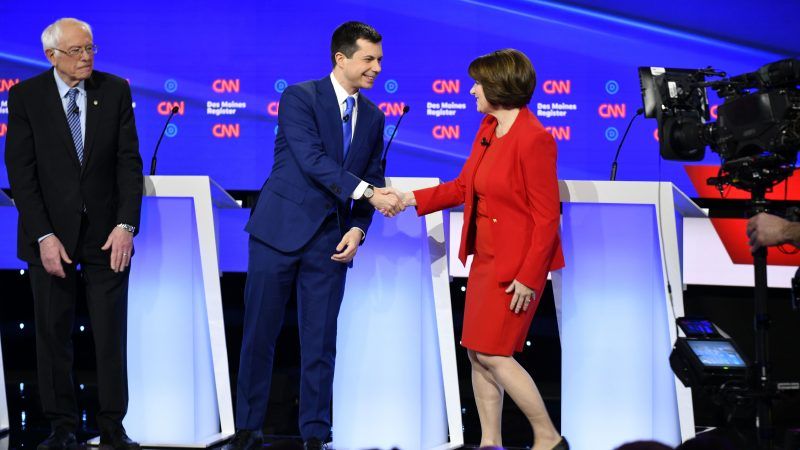Did We Just Hear Three Democratic Candidates Talk About Reducing Deficit and Debt?
What is this, 2008?

Most moments in Democratic presidential debates this cycle can be classified in one of three ways: 1) Let's raise all the taxes! 2) Let's spend all the money! Or 3) Let's squabble endlessly over the dreamy-time details of the tax/spending increases on Medicare for All. That, and whatever stupid slap fights the moderators want to egg on.
So color me flabbergasted that not one but two of the six candidates on stage tonight, Sen. Amy Klobuchar (D–Minn.) and South Bend Mayor Pete Buttigieg said—out loud, even—that they intend to reduce the deficit. Klobuchar, who used to make noises about deficit hawkery back when George W. Bush was president, went first, asking viewers to check out her plan online. And here it is!
Establish a dedicated fund to tackle the U.S. debt and support our economy. Senator Klobuchar will establish a dedicated fund to make a down payment to tackle the U.S. debt and protect our economy. She will initially seed the fund with $300 billion by raising the corporate tax rate and dedicating savings from the government-wide budget review. When the economy is doing well, the fund will finance deficit reduction. When specific economic indicators show our economy is in a recession, the funding will automatically be diverted to increase spending on programs that are effective at stimulating the economy like infrastructure spending, increased unemployment and nutrition assistance, and an increased federal share of Medicaid and CHIP spending. As tax changes are implemented and as departments complete Senator Klobuchar's government-wide review, she will invest additional government-wide savings towards expanding the fund to decrease the deficit and support our economy.
-
Eliminate duplicative government spending.
Etc. Then Buttigieg, who is competing with Klobuchar in the centrist lane of this primary, went further, expressing outrage that Donald Trump has presided over the return of trillion-dollar deficits, and suggesting that Democrats jump feet-first into the issue.
Several minutes later came the real shocker: Sen. Elizabeth Warren (D–Mass.), she of the ever-fuzzy numbers, actually claimed—albeit with almost zero apparent conviction—that her policy plans would, "for those who want to, bring down the national debt." What fresh hell is this!
The last presidential election in which Democrats spent any time at all decrying deficits and debt was…well, the last time there was a Republican in the White House, 2008. While deficit politics came back with a vengeance during the Tea Party backlash to President Barack Obama, that discipline evaporated pretty much the moment Republicans re-took the Senate after November 2014. By the last presidential election, it was all debt denialism, all the time, in both major parties.
So will Democrats turn into the party of deficit reduction? Well, all you had to do was to keep watching—massive climate change investments, free college for most or all, child care, historic Medicare expansion, and so on. Whenever the party gets the keys back to the White House—and it will, someday—the president will do what 99 percent of all elected executives do: Expand power, not voluntarily hand the stuff away. To the extent that deficits will be invoked by Democrats, you can bet it will be in service of raising taxes, not trimming back the sails of state.
Still, it's better to hear politicians talk about this stuff than not. Though until a party campaigns and wins consistently on the issue of reducing government, there is no reason to believe that it ever will.


Show Comments (125)